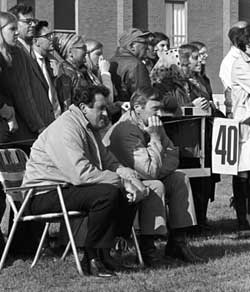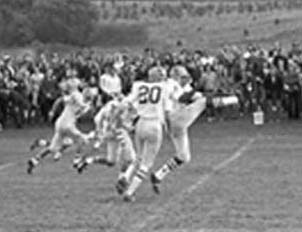
About 60 young men, at least some of them looking like pretty good athletes, showed up that September afternoon in 1972 for the organizational meeting of Madison College's first football team and 30-year-old head coach Challace McMillin was pleased with the turnout.
McMillin hadn't known exactly what to expect. The decision to play football at Madison had been announced only a little more than two months earlier, so McMillin had virtually no opportunity to recruit players for his new team.
The recruiting he did was little more than sending letters to Madison's returning and freshmen male students and telling them that he was looking for a few dozen good men to represent the purple and gold on the football field.
The new coach did a little last-minute recruiting by wandering through the lines for class registration in the Godwin gym. Every now and then – maybe in the line for English 101 or maybe the Fundamentals of Mathematics – McMillin would spot a big guy, sidle up to him and tell him about all the advantages of getting in on the ground floor of Madison football.
There were certainly no world-class athletes among the 60 who'd gathered for the first team meeting. McMillin had coached a top-caliber high school team in Tennessee that probably could have beaten the first-year Dukes. Still, McMillin felt pretty good about the whole thing. After all, drawing interest from 60 men out of the 1,800 who were among Madison's 5,500 students that year wasn't anything to complain about.
In a third-floor meeting room of Godwin Hall, McMillin told his new team about what was going to happen with football at Madison College. He made it abundantly clear that college football was no sport for namby-pambies – it involved bone-jarring physical contact. “I told them all the things we were going to be doing,” McMillin remembered. “I said we'd be practicing every day and working hard.”
The meeting over, McMillin told his 60 players to go down two flights of stairs to the ground floor of Godwin so they could pick up their equipment.
That's when things began to unravel.
When McMillin arrived at the equipment room, fewer than 30 players remained. At first, he thought they'd gotten lost. “Challace even went to look for them,” recalled Brad Babcock, the Madison baseball coach who was pressed into service to double as an assistant football coach that first year.
The series of events that brought McMillin to the disappearing team meeting began a year and a half earlier when he was hired by Madison's new athletic director, Dean Ehlers, to start the school's track and football programs. In his first year at Madison, 1971-72, McMillin founded the men's track program but his name wasn't even in the athletic department's budget – he served as the school's housing director.
Although it had been made clear to McMillin that he was going to start the football program, nothing had been said publicly about the new sport. Madison's president, Dr. Ronald E. Carrier, didn't want to rile the faculty and have them rally in opposition to a step that Carrier knew was absolutely vital for Madison's future.
Madison College had been fully coeducational for only five years and “I knew that we needed to change the psychology of the campus,” Carrier said. Something had to be done to distinguish Madison from the other former all-women's teachers colleges.

“I put the forces into place – the activities, the events, the new courses – that would change the attitude of people and show them that this was truly a coeducational institution,” Carrier said. Football was clearly the most visible of those forces.
Carrier's strategy of holding back the announcement on football until the end of the 1971-72 school year made sense in the broad scheme of things but it certainly put McMillin at a distinct disadvantage.
Although a few more players joined the team before the season began, things didn't get a whole lot better for the Dukes' first football team. At some practices, there weren't enough players to form two teams for scrimmages so one of the coaches would have to fill in.
The fledging Madison team's 1972 schedule consisted of five games against college junior varsity and military school teams. The opening game was set for Saturday, October 7, against the Shepherd College junior varsity team from West Virginia.
The game was to have been played at Harrisonburg High School's Veterans Memorial Stadium. Befitting the hard luck story of the 1972 Dukes, rain poured down on Harrisonburg the day before the opening game. Harrisonburg High officials called Madison's Athletic Director Ehlers and said there was no way they would let the Madison team tear up the wet field on Saturday.
Ehlers and McMillin scrambled around and created a playing field within 24 hours. The site chosen was the field next to Godwin Hall. Goal posts were moved from a practice field and installed by the Madison maintenance crew – along with the coaches and athletic director. The coaches and Ehlers chalked yard line markers onto the field.
There were no stands for the first game but several hundred students and curious locals stood to watch. A few, like President Carrier, sat on folding chairs on the sidelines.
The game was an omen of what would be the world's longest five-game schedule. The Dukes lost 6-0, although McMillin points out: “we had a chance to win but we fumbled on the five-yard line.”
Things didn't get any better. The Dukes played their remaining home games at Veterans Memorial Stadium but a 0-0 against the Hampden-Sydney jayvees was the season's high point. The Dukes finished with a 0-4-1 record and failed to score a point all year.
The pain of the first year was short-lived, though. The team scored its first points in the opening game of the 1973 season and had a winning record in 1974 against a full varsity schedule.
In 1975, only three years after the forgettable 1972 season, the Dukes had their first – and, to date, only – undefeated season. Two players – Madison Hall of Fame quarterback Les Branich and offensive guard Jeff Adams – played on both the Dukes' only winless season in 1972 and its only undefeated season in 1975.
Those original 30 stalwarts who survived the 1972 trip from the third floor to the ground floor of Godwin Hall at that first team meeting set the stage for a future generation of Dukes that would bring home a national Division I-AA championship three decades later.
–Fred Hilton
